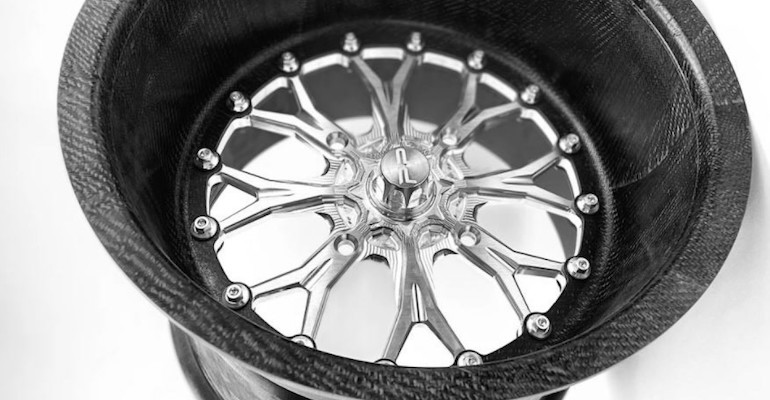Continuous fiber-reinforced thermoplastic composite structures are spun in a highly automated process.
December 3, 2021

Oribi Composites has launched what it calls the world’s first high-performance off-road utility vehicle (UTV) wheels made with advanced thermoplastic composite materials. The new composite UTV wheels are 50% lighter than aluminum yet are able to handle extreme terrain and driving conditions with no compromise to overall strength and toughness.
Commenting on the development, Matt Christensen, VP Business Development – Wheels, told PlasticsToday: “The specific [thermoplastic] material used in the wheel is proprietary, but does leverage a unidirectional, continuous fiber-reinforced thermoplastic and matrix, within a highly-automated manufacturing process, to produce high-quality rims within a competitive cost structure. The wheel is formed using our Spin process, which is an expansion of our foundational 3D Form process for component manufacture,” said Christensen.
Oribi Spin is reportedly the industry’s first production process for circular-shaped, continuous fiber-reinforced thermoplastic composite structures. The process combines automation, robotics, and high-speed thermoforming and enables the adoption of inherently strong, durable continuous fiber-reinforced thermoplastic resins for complex, circular parts.
Spin creates fully consolidated and trimmed structural composite components in less than two minutes, with no-touch labor. As a result, affordable, high-rate production of wheels, structural seals and gaskets, and other circular components is possible.
The 3D Form process meanwhile embraces the inherent processability advantages of thermoplastic composite materials, and delivers high-volume, complex structural components affordably. While the foundation of this process has been well developed in the industry over time, Oribi has built on this foundation with proprietary, high-speed tailored layup, heating, and forming methods, orchestrated by automation and robotics.
“[Wheel vendor] Packard Performance has been an incredibly collaborative partner for Oribi, and we are excited to see these wheels finally enter the market,” added Christensen. “Thermoplastic composite materials address the shortcomings of traditional thermoset epoxy materials — they are inherently tougher, can be processed into parts faster, and are recyclable. Packard Performance now has the unique ability to offer a lightweight wheel, while still addressing durability and toughness for this demanding application.”
Jace Packard, CEO of Packard Performance, commented: “The new composite wheels allowed us to drop an average of 25 pounds of unsprung weight out of the cars. It’s a huge difference, improving speed, responsiveness, and handling during regular driving or racing."
About the Author(s)
You May Also Like




